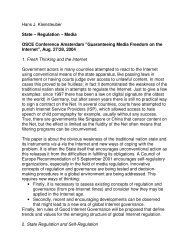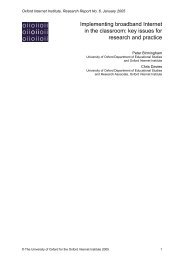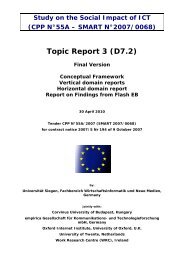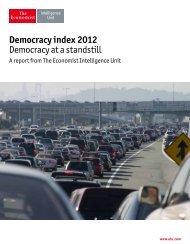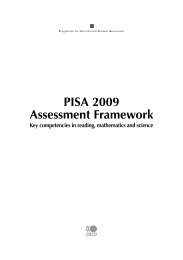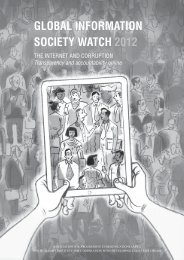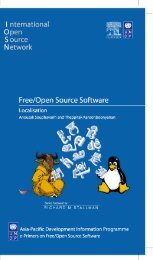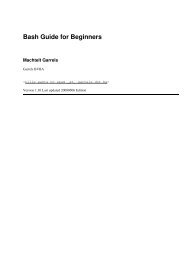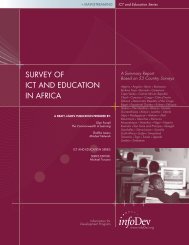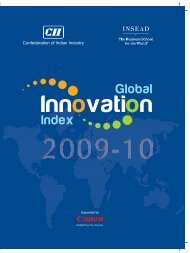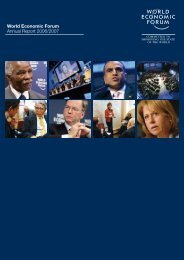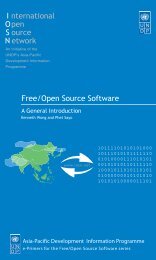Internet Freedom A Foreign Policy Imperative in the Digital Age
Internet Freedom A Foreign Policy Imperative in the Digital Age
Internet Freedom A Foreign Policy Imperative in the Digital Age
Create successful ePaper yourself
Turn your PDF publications into a flip-book with our unique Google optimized e-Paper software.
and Syrians. Yet <strong>the</strong> license does not apply to<strong>the</strong> same technology if it is created and exportedby an organization that does not receive StateDepartment funds. The U.S. government shouldquickly fix this glar<strong>in</strong>g <strong>in</strong>consistency.V. Navigat<strong>in</strong>g <strong>the</strong> TensionsBetween <strong>Internet</strong> <strong>Freedom</strong>and Cyber SecurityBalanc<strong>in</strong>g <strong>the</strong> pr<strong>in</strong>ciple of freedom of expressionon <strong>the</strong> <strong>Internet</strong>, <strong>in</strong> which users can act anonymously,with <strong>the</strong> need for a secure environment <strong>in</strong>which malicious users seek<strong>in</strong>g to do harm can beidentified and stopped by responsible governments,is a difficult challenge. Indeed, policymakers todayare engaged <strong>in</strong> two simultaneous and potentiallycontradictory efforts. Promot<strong>in</strong>g <strong>Internet</strong> freedomimplies advocat<strong>in</strong>g privacy and provid<strong>in</strong>g toolsthrough which <strong>in</strong>dividuals can act anonymouslyonl<strong>in</strong>e. Cyber security, by contrast, implies onl<strong>in</strong>etransparency and attribution. These two effortscreate tensions that are not well understood andfrequently rema<strong>in</strong> unaddressed. Part of <strong>the</strong> problemstems from <strong>the</strong> fact that conversations aboutAmerica’s cyber security and <strong>Internet</strong> freedompolicies have, by and large, taken place <strong>in</strong> isolationfrom each o<strong>the</strong>r. Cyber security policy has <strong>in</strong>volved<strong>the</strong> national security community, while <strong>Internet</strong>freedom policies have <strong>in</strong>volved <strong>the</strong> technologycommunity and a handful of human rights activists– and now <strong>the</strong> foreign policy community.These tensions are real and will sometimes forcedifficult choices, but <strong>the</strong>y should not prevent<strong>the</strong> United States from secur<strong>in</strong>g cyberspace andpromot<strong>in</strong>g <strong>Internet</strong> freedom at <strong>the</strong> same time. U.S.policies will have to address two key tensions: anonymityversus attribution, and defend<strong>in</strong>g aga<strong>in</strong>stattacks versus embolden<strong>in</strong>g autocracies.Anonymity versus AttributionCyber security proponents often advocate greatertransparency <strong>in</strong> onl<strong>in</strong>e behavior and seek toimprove <strong>the</strong> ability of security monitors to reliablyidentify malicious users and track <strong>the</strong>ir activities.“Anonymity is <strong>the</strong> fundamental problem we face <strong>in</strong>cyberspace,” Stewart Baker, former chief counselfor <strong>the</strong> National Security <strong>Age</strong>ncy (NSA), said atan April 2010 <strong>Internet</strong> conference <strong>in</strong> Germany. 132| 33



